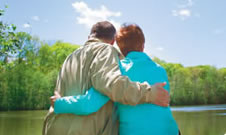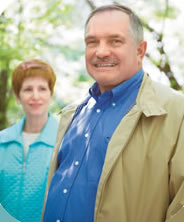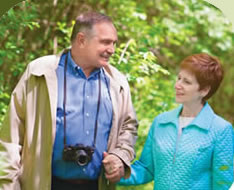Care for the Caregiver
U-M Research comes to the community to support cancer caregivers

When Carol Rugg was diagnosed with breast cancer in 1997, her fiancé Richard Montmorency thought they'd gotten the "in sickness" part of their marriage out of the way early. Rugg fought the disease with Montmorency as her caregiver, an experience they did not expect to repeat as the years passed with no recurrence.
It came as quite a surprise when, 14 years later, her doctors diagnosed her with stage two cervical cancer. Rugg knew she'd fight again and Montmorency, as her caregiver, would struggle through it, too.
"I was always very sensitive that the caregiver doesn't get very much attention," Rugg says. "The caregiver is like a secondary player in this game. That caregiver is stressed to the max and nobody is paying much attention to them."
Helping cancer patients and their family caregivers cope with the disease has been the focus of University of Michigan research led by Laurel Northouse, Ph.D., R.N., former co-director of the Socio-behavioral Program at the Comprehensive Cancer Center. With an estimated 4.6 million Americans providing care to patients with cancer, Northouse believes best practices are needed to allow for this group to receive education and support on providing cancer care.
"Patients are leaving the hospital sicker and sooner than ever before and when they go home, they may have drains or a pump or another medical need," Northouse says. "At that point, the family takes on the care. Patients often return home to a setting where the caregiver, for the most part, hasn't had preparation on how to be a caregiver."

Research indicates caregiver stress can lead to psychological upset and sleep disturbances, as well as changes in physical health, immune function and financial well-being. The extent to which the patient and caregiver can jointly deal with the stress of cancer is beneficial to the well-being of both.
"Carol's treatment was grueling and she could barely eat," Montmorency says. "Toward the end I almost had to carry her out of the hospital. I cooked her rice and peeled her bananas, got her saltine crackers and helped with her medication. It was scary because sometimes she seemed confused."
When the couple later learned about an Ann Arbor-area support group for cancer patients and caregivers, they signed up for the six-week program. The FOCUS Program, in a nutshell, is Northouse's research brought to the local community. Held at the Cancer Support Community, participants attend weekly sessions to learn about how to live through and beyond cancer. The program is unique in that it addresses caregiver concerns and how patients and loved ones can work as a team to manage and cope with the illness.
"They helped me put my role as caregiver in perspective," Montmorency says. "I can support somebody, but I can't change anything. You have to be accepting, and it's not your fault if things don't go right. I felt and saw the sacrifices the other caregivers were making and it made my sacrifice more acceptable."
Cancer Support Community hopes to have data and results from the FOCUS Program by the end of this year; in the meantime, verbal responses from participants have been positive with some groups bonding and exchanging information in order to stay in touch, says social worker Bonnie Dockman, L.M.S.W., who facilitates the program. Ideally, the program will expand to each affiliate of the Cancer Support Community across the United States to broaden the availability of caregiver support.
"This is a great community partnership because we both have an interest in providing high-quality care to patients and their caregivers," says Northouse, who continues to research care for caregivers. She hopes to implement a web version of the FOCUS Program in the future, as well as further expand to more community agencies.
"People in our group discussed making plans for the future," says Rugg, who is currently cancer-free. "We were talking about reasons to hope. At the time I couldn't even imagine planning anything for the future. Now, we're planning a trip overseas."
Tips for a strong patient and caregiver team

Support one another, even though only one person is ill
Communicate openly
Share worries and concerns
Maintain an active lifestyle as much as possible
Continue enjoyable activities
Ask questions to understand and manage symptoms
Help one another cope
Resources to support cancer patients and caregivers
FOCUS Program for cancer patients and caregivers
- Family involvement
- Optimistic Attitude
- Coping Effectiveness
- Uncertainty Reduction
- Symptom Management
Contact Cancer Support Community at 734-975-2500 or [email protected]
CancerCare® Caregiving: Find support and helpful information as you care for your loved one with cancer
American Cancer Society Caregivers
Listen to Tips on Caregiving - part of the Cancer.Net website.
Read more of Laurel Northouse's research on caregivers [PDF]
Continue reading the Summer issue of Thrive.
